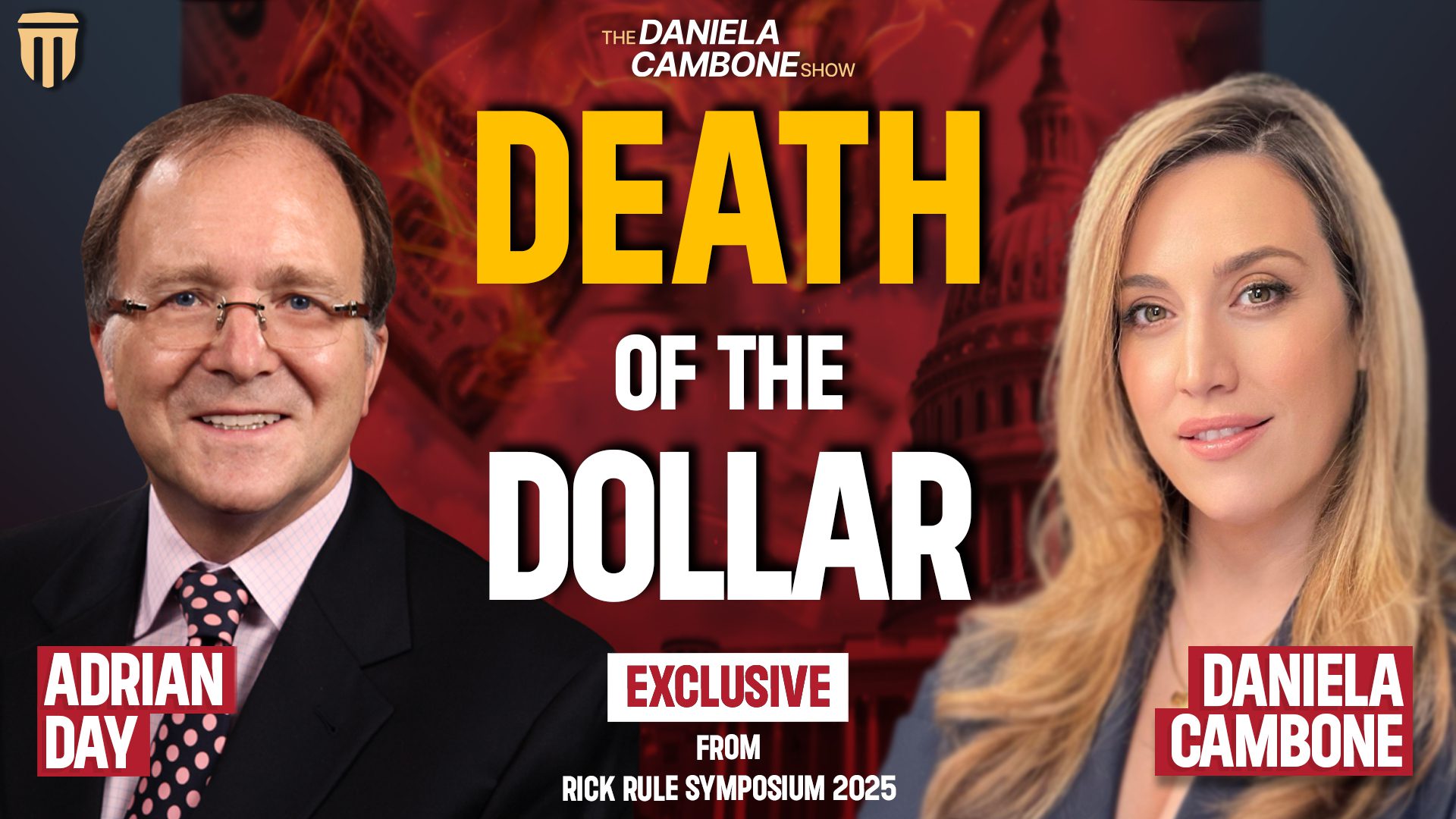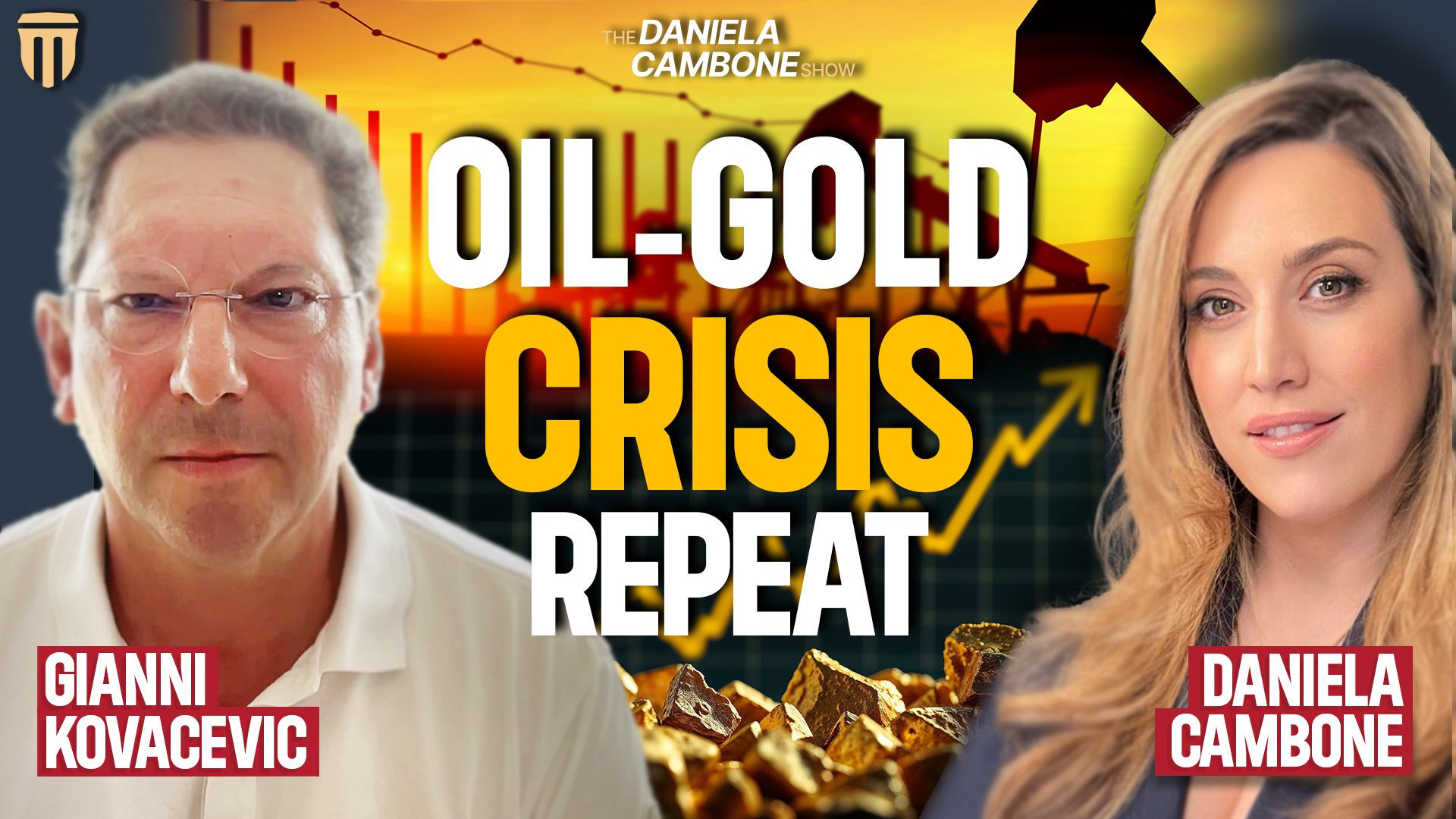Inside China, Russia’s Plan to Beat U.S. Dollar and Bleed America Dry: White House Advisor

The goal that China and Russia have is to bleed money from the U.S. coffers, says Pippa Malmgren, former presidential advisor, economist, and tech entrepreneur. In an exclusive interview with Daniela Cambone, Malmgren elucidates that by compelling the U.S. to deploy military resources, these nations are effectively depleting U.S. financial resources, exacerbating an already considerable budget deficit. She also sheds light on the unprecedented level of distrust gripping both political parties towards the electoral system. “The Democrats are increasingly worried that Kennedy is a setup.. and Trump supporters are afraid of ballot box stuffing,” Malmgren asserts. “This breakdown of faith and confidence in the system itself is historic.” While navigating the complex environment, Malmgren asserts that cyber attacks are occurring in various forms, citing the Baltimore bridge ship collision as an example. “It’s interfering with computers… and a ship is a computer.” Additionally, she emphasizes the need for a more open-minded approach to foreign policy. Don’t miss out on exclusive insights in this first part of the interview—tune in now!
CHAPTERS:
00:00 Political Jiu-Jitsu
5:04 National debt deficit
07:37 China’s
9:03 Cyber attacks
15:19 US dollar
20:41 Leadership in foreign policy
24:26 Bitcoin
27:15 RFK Jr. no spoiler
30:33 U.S. election
38:51 RFK Jr’s appeal to the youth
46:01 CBDCs
TRANSCRIPT FROM VIDEO:
00:08
Hi, this is Daniela Cambone. Welcome back to the Daniela Cambone show. Thrilled to be joined today by Dr. Pippa Malmgren. She’s one of the most recognized voices in the financial and political circles. She’s an American technology entrepreneur, economist. She served as special assistant to the president of the United States, George W. Bush, for economic policy in the National Economic Council and is a former member of the US president’s working group on financial.
00:37
market. She has advised numerous presidents, her accolades go on and on. Dr. Pippa Malmgren, it’s always awesome and fantastic to be back with you. Welcome to the Daniela Cambone show. You too. I’m psyched. I know how busy you’ve been, so I appreciate you making the time, but I was super excited to know you were coming on the show, Pippa, because this weekend I read an
01:07
from the Telegraph, which was a great piece, outlining how China’s gold buying spree could be the straw that breaks the dollars back and how Beijing could hold the key to the imminent demise of the US currency special status. And then I remembered an article you recently wrote as part of your sub stack, why geopolitics is squirrely and nuts. And if you don’t mind, I’m just gonna quote one of your paragraphs here.
01:34
You say people in the financial markets and the military alike spend time comparing military capability, strategy and tactics, assuming Russia or China can be easily defeated in a tank-to-tank or ship-to-ship scenario. China and Russia know they cannot defeat the US using traditional military means. Their strategy is simple. Force the US to deploy military assets which will bleed America dry of cash at a time when the US budget deficit is already overwhelmingly-
02:04
too large and perhaps unfixable. And one last line, create inflation by any means because the US is very politically sensitive to inflation. Okay, that’s why I’m so excited to talk to you because talk to me about what you call this political jiu-jitsu of us. Are we undermining Russia and China here? So let’s understand what I mean. First of all, on a battlefield, most deaths
02:33
from bleeding out. But this is a financial battlefield. And so it’s just like a soldier on the field who’s like, I have better weapons and I have better systems, but they are literally bleeding to death. And that is the strategy Russia and China have. Because when you put aircraft carriers on deployment and you put everybody on high alert, as we are…
03:01
now in the Mediterranean and the Red Sea. And then China sends some more ships around Taiwan. So then we have to deploy there and various ways that we have to be fully ready for a problem. That is hugely expensive. Like, like eye watering expensive. And when I ask people who are expert on this, I say, how much does it cost to deploy one aircraft carrier battle group per day?
03:30
And they’re like, nobody knows. It’s such a huge number. And of course you’re not asking Congress in advance. So there’s a bill coming for all this. So the goal that China and Russia have is to keep us in this forward leaning, ready for anything position that is causing a sound, which is cha-ching, cha-ching, cha-ching, it’s money that is bleeding from the U S coffers. It’s a very clever strategy. And I call it jujitsu because.
04:00
We think we’re in like a direct boxing match and that we can win that boxing match. But in Jiu-Jitsu, it’s all about leverage and it’s all about when the other guy ducks and forces you off balance because you’re already leaning forward. That is essentially a core strategy that is being deployed here. And as I said, you know, conflict is inflationary.
04:26
I don’t know why markets don’t get this, but as long as you are deploying military assets and there’s a risk of conflict of any kind, all of that is inflationary. So when you ask the question, what’s the Fed going to do next? I noticed no one ever mentions. Well, geopolitics means inflation is embedded and it won’t go away until all this ends. So whatever projection you have for the Fed is off if it’s not including this record level.
04:56
defense spending and that’s just on alertness. That’s not on new spending programs. And I’ll ask now, to what extent can they bleed the US dry? And is this not being given serious consideration? Well, you tell me. I mean, we’re already at a point where the interest payments on our debt are pretty much the level of all the defense spending we do.
05:26
So the more we spend, the bigger those interest payments are. And I think most economists agree that that’s an unsustainable level of debt servicing. It’s also, it’s such a strange situation. I know from long experience of working in Washington, I remember once briefing some members of Congress and saying, you know, if you guys keep spending like this, we’re gonna end up with a very profound current account deficit.
05:56
And it was two congressmen and one turned to the other and said, these economists, they’re always talking about the current account deficit. What is the current account deficit? And you realize that, you know, we can take it for granted that we understand what that is, but not all politicians do. So I realized this is a serious moment and these are our elected officials. I have to explain this in a way that they really understand. So I said, basically what it means is we as a nation spend more than we earn.
06:24
And so we borrow money from foreigners to do it and mainly China. Now, this was when I was in the white house, you know, this is under George W. Bush, so we’re talking 2001, 2002. The other senator or the other congressman turns and says, I don’t know anybody borrowing any money from China. And you realize they don’t understand the indebtedness to China. And this is by the way, at the core of our geopolitical problems today, because
06:53
China’s position is, wait a minute, I lent you a hundred bucks, call it a hundred bucks, and you tell me you’re going to pay it back, but you’re pursuing an inflationary strategy now, right? That’s what the bailout of the financial markets was about all your actions say, you don’t mind inflation going up a little bit because that’s how you erode the debt burden. But that means you’ll pay us back a hundred bucks, but what it will buy is much less.
07:23
So you’re defaulting on China. We’re your biggest letter lender creditor and you’re defaulting on us. And our position is, I don’t know what you’re talking about. So they’re like, okay, fine. Which brings up a whole, you know, the other point of, well, but we’re printing all this money. Yeah. We need to still borrow money. I it’s, and now we’re basically in hostile conflict.
07:49
with the country that was the principal provider of funds that allowed America to live beyond its means. Now we got lucky because when China said, we don’t wanna own this stuff, the US government bonds on the scale that we used to, we’re gonna now build what’s called the Belts and Roads Initiative. So we’re gonna stop buying bits of paper money and we’re gonna invest in physical infrastructure, roads, bridges, highways, satellites.
08:18
that will allow us to bring raw materials and resources and water back to China, which is what we really need to live. And so that shift happened much more smoothly than people expected. Everybody thought, oh my gosh, if China sells the US government bond market, interest rates are going to go to high heaven and we’re going to have a big problem. But luckily, the US pension funds started to pick up the slack. So we had a smooth transition. But still, US pension funds own.
08:47
this debt and they too have an issue with inflationary strategies and they too will be concerned about conflict being inflationary and therefore potentially eroding their investment.
09:02
I want to bring up something else in the article before we move on from this topic. You really hammer home the point that the public does not have any idea of what’s really going on in the world and that’s why I feel shows like mine are so important because I can bring on guests like yourself to help educate us all. And you say in the same article that the real kicker though, and this is according to Christopher Wray, the FBI director who came out with the clearest statement yet,
09:31
saying that the conflict is actually happening inside the US, not abroad. He warned us of China’s ability to physically wreak havoc on our critical infrastructure at a time of its choosing. He implied China and Russia are preparing for a bold and unrelenting attack on the US just waiting for the right moment to deal a devastating blow. You say, next thing you know, little towns in Texas find the water supplier being hacked and disrupted. You then bring up.
10:00
that the 9-11 network went down across South Dakota, Nebraska, Nevada, and Texas on April 18th. None of the explanations made any sense, especially since these networks are so distant. The problem isn’t the news, it’s the decision not to print it.
10:19
Yeah. And then look what’s just happened in the last 24 hours, the British Ministry of Defense announced that China has hacked into their systems, which is extremely concerning since they are America’s closest defense ally at a time when President Putin in Russia is threatening to use and deploy nuclear weapons.
10:45
And I do think we’re in a moment of history that is not so different from the Cuban missile crisis. One thing I find strange is that, again, the gap between what you hear people in the strategic security community being concerned about, as you saw that Christopher Wray comment is pretty blunt, right? And then the general public who are like, oh yeah, we’re at war, but it’s over there in Ukraine, or it’s over there in Israel and Gaza.
11:13
And you’re like, well, is it? So let’s talk for a minute about where is this war? Yes, there are two locations the media likes to report for very specific reasons. One, they can send photographers. So you have photo ops, because we live in a world where people don’t read the news. They look at the pictures to understand the news. So photo ops are really, really important. And second, you have the tragedy of the loss of human life. That means there’s a human interest element in the story.
11:42
But the other events are at least as important and strategically critical. So as an example, right now, the Russians are jamming the GPS in Estonia. Now Estonia obviously is a major target for the Russians and it’s important for us because NATO’s headquarters for cyber is inside Estonia.
12:09
And Estonia is a country where you do everything electronically. You wave your phone to pay for the parking space. You wave your phone to pay for lunch. Right. Nobody even carries credit cards anymore. So the whole country depends on GPS and connectivity. So at this point, my understanding is that commercial aircraft can’t even land safely in Estonia because the GPS is all down. And so the sat nav.
12:37
Everything you need to safely maneuver is not working. Does that render Estonia effectively a war zone? I would argue yes. I would go further and say, you know, 50 days before the Russians rolled into Ukraine, there was an event in the Arctic that had tremendous significance, which was, it’s clear that somebody cut, but we think the Russians cut.
13:04
What is the fastest internet cable in the world? Now, why is it up in the Arctic in the middle of nowhere where there’s like polar bears and nothing else? The answer is cause that is the point where most satellites connect to earth. So if you cut that cable, that’s not just the end of missile guidance systems, but it’s the end of door delivery. It’s the end of ways, right? Like our whole earth economy depends on these satellite links.
13:34
And so it was a clear indication of the level of intent and hostility. The chief of the British defense forces, Sir Tony Radekin, at the time, came straight out and said, this should be seen as an act of war. And the next day it disappeared because everybody went, oh my gosh, we don’t want to say we’re directly in conflict with Russia, because if you’re a super power to super power, boom, it starts to go into nuclear very quickly.
14:01
So every time we have one of these incidents, everybody kind of tries to push it down because the consequences are so severe. And I’ll just finish by saying, in the U.S., there is a conversation, whether it’s an accurate, realistic conversation or not, we can have a conversation about that. But there is a view that, for example, it’s maybe not an accident that we had a massive container ship
14:31
have a power outage, hit a bridge in Baltimore, and less than four days later, a near similar incident at the Verrazano Bridge in New York. Now, can we prove that? Maybe not. I’m just saying in the strategic security world, these events are not going unnoticed. And it’s why the head of the FBI is saying, actually, we need to be prepared.
14:56
for these kinds of, those are cyber attacks. That’s what that is. If that is what’s happening, it’s not a physical attack. It’s a cyber, right? It’s interfering with computers. And so that’s what we’re talking about. Maybe it’s cause the public doesn’t understand that a ship is a computer, right? Maybe that’s part of the issue. What do you make of former president?
15:23
Donald Trump’s economic advisors considering ways. So going back to us talking about weaponizing the dollar, that they’re looking at ways to actively stop nations from shifting away from using the dollar in effort to counter budding moves among key emerging markets to reduce exposure to U.S. currency. This is according to people familiar with the matter. So his team actively looking, according to this report, to…
15:52
penalize nations that break from the dollar. Would a counter move like that, could that possibly work? Is that the solution? It’s a tactic. I don’t think it’s a solution, but let’s back up a little bit. So when the events with, when the policy dialogue with Russia started to unravel,
16:21
The US said, let’s kick the Russians out of SWIFT, the global bank clearing mechanism, and exclude them from the global financial markets. The Russian response to that was, fine, we’ll build our own SWIFT, which they have in collaboration with China. The rest of the world saw this and went, wow, if you cross the Americans, they can really hurt you by excluding you from the global financial system.
16:51
Maybe it’s safer to have a backup. And so many nations, especially the BRICS, started to work with Russia and China on these alternative money clearing networks, which are not controlled by the United States. And now it’s gone further because those parts of the world are much readier to, to deal with new technology than we are. So the position in the U S on.
17:20
cryptocurrency on tokenization on Bitcoin has been shut it down. It’s all bad. The rest of the world is like, well, actually these are very innovative, clever ways of creating a financial structure. And so they are pioneering this. And we see lots of what they call CBDC, central bank digital currency, which is kind of an umbrella term.
17:47
uh, being innovated in places like the Emirates in, um, China. And so again, many nations are going, well, I would like to be part of that innovation and the U S says, we’re not going to do it. It’s all illegal. You can’t touch it. If you try, we’ll arrest you. So obviously what we’ve done is to say, if you don’t play by our rules, we’ll kick you out of our game.
18:13
Now they’re out of our game, they’re creating their own game and they’re like, wait, wait, we don’t want you to have your own game. That’s what you’re describing as the Trump response. But what penalties can you impose that would cause them to come back into our system and would we even let them in? So this is like competing financial systems, by the way, at a time when people are losing confidence in the U S dollar Western currencies because of our inclination to lean towards inflation.
18:43
And yet the US is the best performing economy in the world. And it’s the only one with the law that protects investors, protects private property. So I do not see the whole world shifting over to the Chinese currency. Right. And it’s not convertible either. So you can get in, but you can never get out. That’s not very pretty either. So yes, we have our issues, but I still think the dollar is preeminent.
19:12
Yeah. You’re basically saying you don’t see the end of the empire anytime soon. I don’t see it from that cause, but I am concerned that we are overspending without a clear strategy. And, you know, I guess this is the core question for both of these topics that you’ve mentioned. What’s the outcome we want? That’s the question, not can we beat the bad guys or should we do this? That it’s.
19:41
What is the ultimate outcome? And I personally think we have to think like George C. Marshall did at the end of World War II. You cannot have a world where you simply cancel a country. You can’t say to the Chinese you’re out and nobody’s allowed to deal with you. And too bad, right? It’s 1.4 billion people. And we can’t just go away quietly and live a below standard life with no complaining. Right.
20:11
And same with Russia. We may be so profoundly upset with President Putin and all that has happened, but we cannot expect to live in a peaceful future if we don’t find a way to integrate Russia post-Putin back into the world economy. So this is, I know it’s hard, but you can’t have a world economy where you just say, okay, we cancel Russia and we cancel China. Really? I think we’re going to have a fight if we do that.
20:41
So you need leadership that can have these dialogues. And the question is who’s the who’s the best for that to have these conversations and come to the table with China with Russia. Yeah. And also what’s the what’s the attitude? So I’m just recording a series with my father who some of the audience will know yeah, master Harold Malmgren because
21:11
He was in the room during the Cuban Missile Crisis and was part of the team that helped resolve that. And similarly, when Nixon sent Kissinger to Beijing to open the dialogue with the communist world, he sent my dad to Moscow. And then my dad worked with the Russians over all those years to have this conversation. And he always quotes, I think quite rightly,
21:39
Otto von Bismarck, who was the iron chancellor, one of the great foreign policy leaders of Western Europe, who said, diplomacy is the act of building ladders for others to climb down. You know, you have to acknowledge sometimes that people make really terrible mistakes and they’d be very bad guys. But if you want to get resolution, you have to get past the blame enough to get progress. And then usually, whoever made those mistakes gets thrown out by their own people.
22:09
which is more the direction one would want to go, right? But again, what’s your goal? What’s the end goal? Is it that you want to say, we win, you lose, okay? Then the fight will continue. And this is one reason that I’m watching the developments in Ukraine and the negotiation being done by Burns, the head of the CIA, because it does sound like we are edging closer to a deal.
22:40
but it probably will be an armistice. Now, most people won’t remember what is an armistice and why does it matter, but North Korea, South Korea got resolved by an armistice because in that, nobody wins and nobody loses. You have a stasis and usually you have a demilitarized zone, a demarcation between the two sides and a cessation of the hostilities. And that may be the best you can get.
23:08
What I see is I think the Biden team is also moving in this direction. The timing is the issue. They don’t want to announce a deal until say September because they need the election. I mean, the election will be affected by such an announcement. So they’ll want it to happen closer to the election. President Putin’s reaction is fine. I will make your life hell between now and then. And that’s, it’s suddenly noisy. And you hear the head of the FBI saying, you know, brace, brace, we may have trouble here at home.
23:39
Then you have the other candidates, both Trump and Kennedy, saying, why are we in these wars? We should get this resolved as quickly as possible. And in Kennedy’s case, he says America should lead with ideas, not with bullets. And in Trump’s case, he says we should lead with deterrence, so appear very threatening so that nobody tries to pull anything. And let’s not forget.
24:07
We’re in a period of history with record level defense spending, not just in the U S but now in other parts of the world. The whole purpose of defense spending is to deter. It is not to use it. If you end up using your military equipment, something’s gone wrong. Deterrence failed. I want to get, and not to segue, but I want to get back to when you’re making the point of you can’t, you can’t see, you know, folks.
24:33
flocking to the renminbi, for example, over the US dollar, but we are seeing more and more people turn to alternatives like Bitcoin, like gold. So when you were talking about the possibility of like the grid going down, how do you see, I mean, do you have any thoughts surrounding Bitcoin? And does that make it a safe choice, given the fact that we could be at risk of a major cyber attack? Well, and look, the grid can go down without a cyber attack.
25:02
Right? Our grids in the United States are dearly in need of attention and money and investment. So, you know, we don’t need a, an opponent for this to happen. We just need lack of maintenance. Um, and so, yeah, I think it’s a bigger question. All of our reliance on electronic systems depends on certain infrastructure. So one aspect of this I’m always banging on about is
25:28
the continuous attacks on subsea internet cables. And they’re happening all the time. And again, it started with the one in Svalbard, but most people don’t pay much attention because, well, honestly, I guess people think that wifi is just in the air and just like electricity comes out of the plug in the wall, they’re not thinking through what is the infrastructure that provides this. So subsea cables are
25:58
very vulnerable, very much under attack. We’ve seen, and it’s central to understanding the geopolitical position as well. So for example, there was a, somebody cut the cable between the Scottish Shetland Islands and the Danish Faroe Islands. Most people are like, well, there are only sheep living on these islands, so what do we care? But if you look at the map, you see that…
26:24
If Russia is threatening to put nuclear weapons on submarines, this would be the principal pathway to come from Russia into the Atlantic. So is NATO watching that little gap? It’s called the Greenland-Iceland-UK gap, the Jeyuk gap. Are they watching it with incredible focus? Yes. So you cut that cable. Does it make it harder to track? Yes, it does. So when you ask Bitcoin, it’s dependence on electricity.
26:54
and all electronic crypto tokenized assets, 100% depend on electricity. And yes, we live in a world where electricity is under threat from lack of investment and geopolitical focus.
27:16
Let’s go back to politics for a second. Not that we ever segued, but you brought up RFK. So there’s so much going on right now. And you say, look, we need to take RFK Jr. seriously here because it’s no longer a two-man race. You say it’s a full-on three-man race. And you know, this, we could talk about his no spoiler pledge that they just announced.
27:46
Um, where he, where he called for Biden to agree to co-fund in October, a 50 state poll with 30,000 or more likely voters. This is essentially effectively a zero margin of error in October of 2024. The survey will test the results of a head to head race pitting president Biden versus president Trump and a second head to head race pitting me against president Trump. So basically I’ll let you explain what the spoiler is. Um, but he’s trying to, you know, really hammer home the point. I’m no spoiler here.
28:16
Right. And that he won’t be a spoiler because if Biden is ahead, and by that way, that poll that he’s suggesting was for Democrats. So he’s saying, let’s go to the Democrats and say, which one of us do you want? And if they choose you, Joe, I agree to concede all my votes to you because I don’t want to be the guy who gets Trump in. So I won’t be a spoiler, but you need to make the same commitment.
28:46
that if I am ahead with the Democrats, that you will agree to drop out. And of course, the president is not very likely to agree to that, but now he can’t argue that Kennedy is the spoiler because he may be the spoiler. And so let’s look at the kind of history of what’s happened here. Initially, the view was, Kennedy didn’t matter. It wasn’t going anywhere. She didn’t need to pay attention to it.
29:14
Then he started to get serious traction, especially with the young. And at this point, I’d say he owns the under, he totally owns the under 25 year old vote, totally owns the under 35 year old vote. He almost owns the under 45 year old vote. And when boomers, when he gets in front of boomers, the conversion rate is huge, really huge. And now part of this is because people are looking at what will be on the ballot and they see Biden, Trump.
29:43
and frankly, Mickey Mouse. Like anybody is a better alternative for lots of people right now. So whether it’s Kennedy himself or whether it’s just give me a third choice, it’s hard to tell today. But what is clear is that this business of pretending it’ll go away is not working. The numbers are now sufficiently high that they’re having to acknowledge. So then the reaction is okay, but then he’s a bad guy because he’s a spoiler.
30:10
But now it’s like actually not a spoiler and in a head to head race between Kennedy and Trump, Kennedy looks like he wins. So that is a whole different ball game than people had been thinking. Um, and I know you took a deep dive with the numbers based on, um, reporting from Don Luskin of Trend Macro. Uh, where, where basically, I know he goes into a deep dive with the math.
30:41
But basically no one gets to require 270 votes. It might take just 37 electoral college votes for Kennedy to win the presidency and bring about the end of the six party system in America. I believe you said even RFK was surprised by that when they, when you showed them the numbers. Well, look, and Don Luskin, I think his research was in front of Kennedy. Let me explain. In the constitution, it provides that
31:10
somebody has to win 270 votes in order to win the presidency through the Electoral College. If nobody gets 270, then it automatically goes to what they call a contingent election. We haven’t seen one of those since the early 1800s, but we saw it three times between 1800 and I think roughly 1830. And what happens is it goes to the House of Representatives.
31:35
Not the old house, but the new one that’s going to be sworn in. So we’ll have to wait until January before we know who’s in that house. And then they decide on a state by state basis, not a party basis. So in a contingent election, Trump won’t be able to flip any of his opponent’s dates and Biden won’t be able to flip any of his opponent’s dates, but Kennedy, because he’s in the middle and because he can negotiate with both sides.
32:05
He may be able to go to the narrow victory states. So you’re talking places that were, you know, Biden only held by 0.3% in the last election. He can go to those states and say, here are the five things I know you guys really need. I would agree to those five things if you’ll support me. So it won’t be a left right or a red blue vote. It’ll be a negotiation. And so,
32:35
In my view, if we get to a contingent election, Kennedy’s chances skyrocket and he can win because you just got to get to 26 states first. And so it’s all about that negotiation process. Now, to be clear, you only, Kennedy only needs to pull 37 votes away from Biden and he doesn’t get 270, so it’s not a lot of votes. It’s a very small number.
33:04
Probably not much more than that. And it may be that a total of something like 50 is enough to deprive both Trump and Biden of the 270, which is all Kennedy would need to do to throw it into a contingent election. And let me just add one more thing. Let’s be clear. Trump is focused on the states with the narrowest Biden victories that Trump could flip most easily.
33:34
That’s Georgia, Arizona, Wisconsin, you know, that adds up to 37 votes. So if Trump alone flips any other single state, he can win by depriving Biden of those 37 votes. So it’s increasingly looking to me like we will be facing a contest between Trump and Kennedy rather than Biden.
34:03
But it is so emotionally challenging for many people. It’s very hard for them to imagine this, but I’ll just say one other thing on this thing. When you look at the recent course of American history, Americans love electing the total long shot outsider. Bill Clinton was, nobody ever heard of him three years before he became president. He was like the kid on the, he was like the water boy on the baseball team. And everybody else.
34:32
But I’m not running against George Bush senior because you can’t win. And the kid went, let me try, let me try. And then George Bush senior stumbled and suddenly we end up with this young president that nobody knew anything about. Similarly, nobody heard of Obama and nobody thought Trump was going to win. And the only exception to the rule is Biden, who was a, I can’t handle Trump vote. And so what if Americans stick to the pattern and they keep going?
35:01
for the long shot outsider. Except you, you knew Trump could win because you wrote a piece on it in 2015 and people thought you were crazy at the time. Yeah. And to be clear, I wasn’t arguing for a position of preference. Right. I was observing as I am now, forces at work in American politics and going, Whoa, I think actually Trump could and probably will win this. And then he did.
35:30
I have the same view on Kennedy today is that it seems so outrageous. And yet there’s something profound happening, particularly amongst the youth in America. And by the way, everybody says, oh, well, the youth never show up. Right. So they, they, they can make all the noise they want, but they won’t vote that that’s what they said to Obama and Obama managed it. Well, and this is bigger than Obama, I think. Well, let me ask you this then, because, uh,
35:59
You know, you, you’ve been front and center and, uh, you know, at the white house, um, through multiple elections. Do you think this might be the most exciting one yet for you? Yeah, it’s, this is so big that I made a decision to move back to the U S after many years living in Europe to have a front row seat on this thing. And it’s for even bigger reasons too, because. You know, the presidency that I worked for came to power on a.
36:28
on a contested basis, right? The hanging chads. And I think this is gonna be hanging chads on steroids because already the Trump supporters believe that they basically don’t trust the election process. They still don’t. They’re afraid of ballot box stuffing. They’re afraid if a contingent election is triggered, they’re gonna say, this is all a setup.
36:58
The Biden team are increasingly worried, or the Democrats are increasingly worried that Kennedy is a setup, right? That it’s all rigged somehow. And this breakdown of faith and confidence in the system itself is very, very important. It’s historic. We have not seen this before. And by the way, notice, in American history, we’ve never elected an independent.
37:27
because so few Americans identified as independent. But today, depending on which polls you look at, arguably as many as half, or in some of the higher polls I’ve seen, 60% of Americans no longer identify as Republican or Democrat. They either identify as independent or they feel independent, and they don’t feel aligned anymore. So a Ross Perot couldn’t get too much traction
37:57
Most Americans were Democrat or Republican, but that’s not true today. And so that’s another reason why this could be much it’s, this isn’t just about this election. This is about, could this be the beginning of coalition politics being introduced to the United States? Because if we’re in a contingent election based on a coalition negotiation, that would be the beginning of that. Is this the beginning of an election where?
38:26
the outcome is always contested. And what position does that leave the nation in if you have both parties contesting outcomes, which if Kennedy wins through a contingent election, both sides are going to contest this outcome. I, uh, I would think so. Um, I promise I’m going to get to the fed, but just one more point because you were saying how RFK is especially appealing, um, to the younger generation. So.
38:56
I’m just curious, what do you think about him? I mean, is it his platform pitches of, I’m gonna put the entire US budget on blockchain, like innovative thinking like that, or backing the US dollar by something like Bitcoin, or going back to some sort of gold standard? I mean, what, or is it just because it’s not Trump or Biden? I mean, what about him do you think is appealing to that demographic?
39:23
Yeah, it’s a whole bunch of different things. Um, it is partly the, I don’t like either Trump or Biden. So like I said, the Mickey Mouse option, give me anybody else and I’ll, I’ll try that, that, that cannot be underestimated. That’s one thing I think. Um, look, the parties all moved to the extremes and more and more the game was dominated by getting financial contributions from.
39:51
people who wanted it to be at the extremes. And so the Democrats have gone further left, the Republicans gone further right, and this has left a vacuum in the middle. And Kennedy is stepping into that. Then he’s saying, well, let’s talk to both sides. And he says, look, he’s basically like a Bill Clinton Democrat in the sense that he says, look, entrepreneurs are building the future, so we shouldn’t tax them, we shouldn’t penalize them, we should encourage them and make life easy.
40:21
But big corporations are using the best lawyers to pay zero tax, and that’s not quite right. And both Democrats and Republicans start nodding in agreement that something is needing to be done there. On the other side, he’s like a old fashioned Republican who says government should leave you alone once you’re at home. And therefore things like abortion rights, which is a super hot issue for this election.
40:50
Candidates like, you know, it shouldn’t be the Supreme Court deciding, it should be states deciding, which by the way is also Trump’s position. And that is a kind of a third way that leaves opportunity open for those who support the right to have an abortion, but doesn’t conflict too hard with those who are opposed. So this kind of, there’s a third way is what he represents. There’s a new way. There’s a third way.
41:20
And then they get into specific issues. The young are very interested in the environment and he’s a hardcore environmentalist who’s, you know, earned his chops actually working in that space for many decades. The Trump people are not that interested in the environment and they like the kind of drill, baby drill approach. And the Democrats haven’t really sticked out that territory. So
41:45
They’re losing the youth to the one person who says, not only am I for this, but I devoted my life to this. So there’s an authenticity there. But I’ll say one last thing about this, which is important for investors to understand and observers of politics. Every presidential election is affected or even determined by a technology. So let’s go back in time.
42:12
Trump won on Twitter at a time when nobody really understood what the heck is Twitter. It’s 120 characters. How do you raise money on Twitter? Like it was a completely novel phenomena at that time. Previously Obama won on YouTube at a time when nobody understood what the heck is this YouTube thing and how do you raise money? And I remember.
42:35
The Democrats laughing saying you can’t win the presidency on thousand dollar contributions on this funky thing called YouTube, and then he did and it worked. So by the way, Kennedy’s raising $100 increments and he’s keeping par with his opponents on Instagram and podcasts. So this is the way to watch this race, right? The last
43:01
Republican presidential debate had 2 million live viewers. The Joe Rogan Kennedy podcast, I think had 30 million live viewers. If you want to really understand this race, you have to know the technology platforms and one of them is podcasts. This is a podcast presidency and second Instagram in a supporting role. And by the way, every time
43:28
The media establishment tried to block Kennedy, which they’ve tried to block him from Instagram or change the algorithm so that political entities get suppressed by, uh, by the algorithm. Basically it makes them more popular, right? There’s nothing like banning a book to make a book incredibly popular. So it’s totally backfiring and contributing to the kind of sense of this is edgy and this is cool and something’s happening that
43:56
the young want to be part of. So I think all of that, and to finish on Bitcoin and on this blockchain story that he announced, what he’s really saying is let’s use new technology to solve these old problems. It is a intriguing notion that if you put the whole US budget on a blockchain-like structure that suddenly
44:24
you’d be able to see, well, who is spending, you know, $10,000 on a toilet seat and why does that make any sense? This is completely a practical in real life, but the desire to introduce more transparency and more efficiency through new technology is actually very appealing, especially given that all these problems are so totally intractable. I mean, you know, there are whole…
44:51
departments of government that cannot be audited because they don’t know where the heck their money is. So I would say this, new technology is coming in money. And even the current Biden administration is thinking through CBDC. They’re thinking through legalizing Bitcoin. I think that if Biden wins, that will come. And they’re going to say, you can own it and it’s legal tender, but you can’t own it anonymously and you have to declare it for tax purposes.
45:21
And everybody in the Bitcoin world is going to go, wait, wait, but the whole point was to be outside. And I’m like, I’m sorry, but you cannot escape the state. You will not be able to operate outside of officialdom. But once this happens, the value of Bitcoin is going to go way up. And by the way, who’s the largest government holder of Bitcoin today? I would argue it’s the United States and they have acquired it through confiscation.
45:50
And when you’ve confiscated that much, you actually would like it to be useful and put it to work, right? So. I’m just curious to get you mentioned central bank digital currencies, and I swear I’m getting to the Fed, but just to get your thoughts on CBDC. Is it something do you feel we should be fearing or accepting or. You know, just, just the way it is. And.
46:21
It’s coming, whether we like it or not. I mean, just your thoughts on central bank digital currencies, danger or not. So as with all technologies, it cuts both ways. You can use the car to safely transport your family and you can use it to mow a family down. It’s always both ways. So the real question to me is, is there a way that you can bring its efficiencies without
46:50
putting human beings in harm’s way. Now, what are the harm’s ways? Because when you talk to regular people, they say, I have nothing to hide. And I say, okay, do you ever order ice cream on DoorDash or Uber Eats or whatever your home delivery food system is? Do you ever order that at 11 p.m.? And they all go, well, yeah, I do. And I say, okay, so here’s how the game works. The algorithms are based on correlations.
47:19
The correlations are that if you’re buying that and eating it at 11 PM, that implies, rightly or wrongly, that you might not be mentally stable. You might be emotionally unstable. And that then shows up because we all have a digital twin, right? And the digital twin of you knows more about you than you know about yourself. With CBDC.
47:45
That is a way for the authorities to literally see everything on your phone, everything that you do. It’s not just as well, what are you buying and what time of day are you buying it and what are the implications of that? It’s also your, your iPhone literally in your pocket now can tell whether you’re heading towards a heart attack just from the way you walk. And so all that information starts to be in the hands of authorities. So my question is.
48:15
Can we create a strategy, a protection, call it a digital bill of human rights that protects individuals from being treated differently, discriminated against for reasons that they don’t even know? So let me give you, just to finish this, because it’s really important, a practical example of the ice cream. So I was talking with the CTO of one of the world’s biggest banks, the chief technology officer, and he says, look,
48:44
we can see when a couple is going to be divorced because of the spending patterns between the two. So one of them is eating Uber Eats at 11 p.m. and the other one is off at conferences, having dinners offsite with somebody else. So we could start to drive down the credit limit of the lower earning partner in anticipation of the coming financial crisis, which would be smart from the bank’s point of view.
49:11
but incredibly cruel and unfair to that person’s point of view. And by the way, that’s typically the female, not always. But then when that woman realizes she’s getting divorced and she needs to get a job, she applies. All the HR departments are also canvassing all the data on her digital twin and seeing, hmm, maybe not emotionally stable. I…
49:36
This is the world that we are in. And we talk about the Chinese social credit system and we don’t wanna be like that, but maybe we are becoming like that and ours is privatized, right? Ours is private search engines and corporate information. And so I’m just saying when you add CBDC into that, you could be empowering the authorities to know way more about you than you know about yourself.
50:04
And I think we’re going to need a digital bill of human rights to protect against abuse of that. There are some people who say there’s no way to do that and therefore we can’t have CBDC. And I can understand that in the current environment where Congress can’t even negotiate, you know, whether, you know, simple things can be done or not done. This is a complex matter that maybe they are not capable of navigating.
50:34
So these are the issues to think through with regard to CBDC. All right. That concludes part one of our lively discussion with Dr. Pippa Malmgren, truly an honor to have her on the show. We’re going to get to part two where she discusses her viewpoints on the Fed, on the real deal on interest rates and what you should be doing to prepare for the future. Speaking of which, as always, I invite you to book a free session with one of my
51:03
beautiful colleagues over at ITM Trading. They are super informative and educated on the state of affairs and they’re happy to help build a strategy built specifically around your needs. It’s a free session so I urge all of you to try it and do it. You can book a Calendly appointment in the link below of the description of this video. We’ll see you for part two.
SOURCES:
https://spectrumlocalnews.com/nys/central-ny/politics/2024/05/01/rfk-jr–announces
https://drpippa.substack.com/p/its-a-three-way-race-for-the-white
https://twitter.com/DrPippaM/status/1508694213403320326
https://www.fpri.org/article/2023/06/china-is-doubling-down-on-its-digital-currency/
https://foreignpolicy.com/2022/03/08/swift-sanctions-ukraine-russia-nato-putin-war-global-finance/
https://news.sky.com/story/china-hacked-ministry-of-defence-sky-news-learns-13130757
https://drpippa.substack.com/p/berliner-jiu-jitsu-jupiter-why-geopolitics
https://fiscaldata.treasury.gov/americas-finance-guide/national-deficit/
https://www.telegraph.co.uk/business/2024/05/05/china-gold-buying-spree-straw-breaks-dolllar-back/
https://www.youtube.com/watch?v=N3Z3RpRYL8o
https://www.politico.eu/article/suspected-china-hack-hits-uks-defense-ministry/
https://www.youtube.com/watch?v=EZOWbWuMKDI
https://www.youtube.com/watch?v=xsBEnItEhws
https://www.youtube.com/watch?v=mhJahLfD0ZM
https://ontheworldmap.com/faroe-islands/faroe-islands-location-map.html














